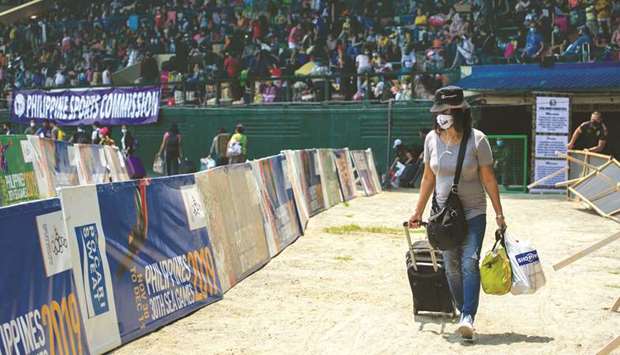The number of coronavirus infections in the Philippines rose to more than 85,000 yesterday, surpassing China’s total confirmed caseload, as the Health Ministry warned the country’s health system was “close to being overwhelmed.”
The ministry reported an additional 1,874 confirmed cases, bringing the national tally to 85,486, topping China’s 84,060.
Sixteen additional deaths were confirmed, bringing the total to 1,962. Despite spiking numbers of infections, the government’s inter-agency task force on Covid-19 approved the re-opening of the businesses at 30-per-cent capacity from August 1 in some areas, under a relaxed general community quarantine protocol.
“These include testing and tutorial centres, review centres, gyms, fitness centres and sports facilities, internet cafes, establishment offering personal grooming and aesthetic services, pet grooming and drive in cinemas,” presidential spokesman Harry Roque said in a statement.
The decision to allow more activities was taken during a meeting on Tuesday, when the Department of Health noted that, as of July 26, 52.3% of hospital beds allocated for Covid-19 patients were now occupied, meaning the health system had entered the so-called “warning zone.”
“Nationally, our health system is close to being overwhelmed,” the Department of Health Undersecretary Maria Rosario Vergeire said. “Our doctors, nurses and others who look after us in hospitals are growing tired.” “That is why we appeal to everyone to follow the minimum health standards, and to just stay at home if there’s nothing important to do outside,” she added.
On Monday, President Rodrigo Duterte told Congress in an annual state of the nation address that while the administration’s response to the outbreak was not perfect, the interventions had prevented up to 3.5mn infections. The government imposed a lockdown in the country’s most populous island of Luzon, including Manila and other high-risk areas, in mid-March in a bid to contain the spread of the virus. On June 1, the government began to ease the restrictions, allowing malls, private offices and public transport to resume on a reduced capacity.

Photo taken on July 25, 2020 shows a woman walk to get a Covid-19 rapid test in a baseball stadium, where Filipinos stranded due to the coronavirus restrictions are gathered before being transported back to their provinces through a government transportation programme, in Rizal Memorial Sports Complex, Manila.
